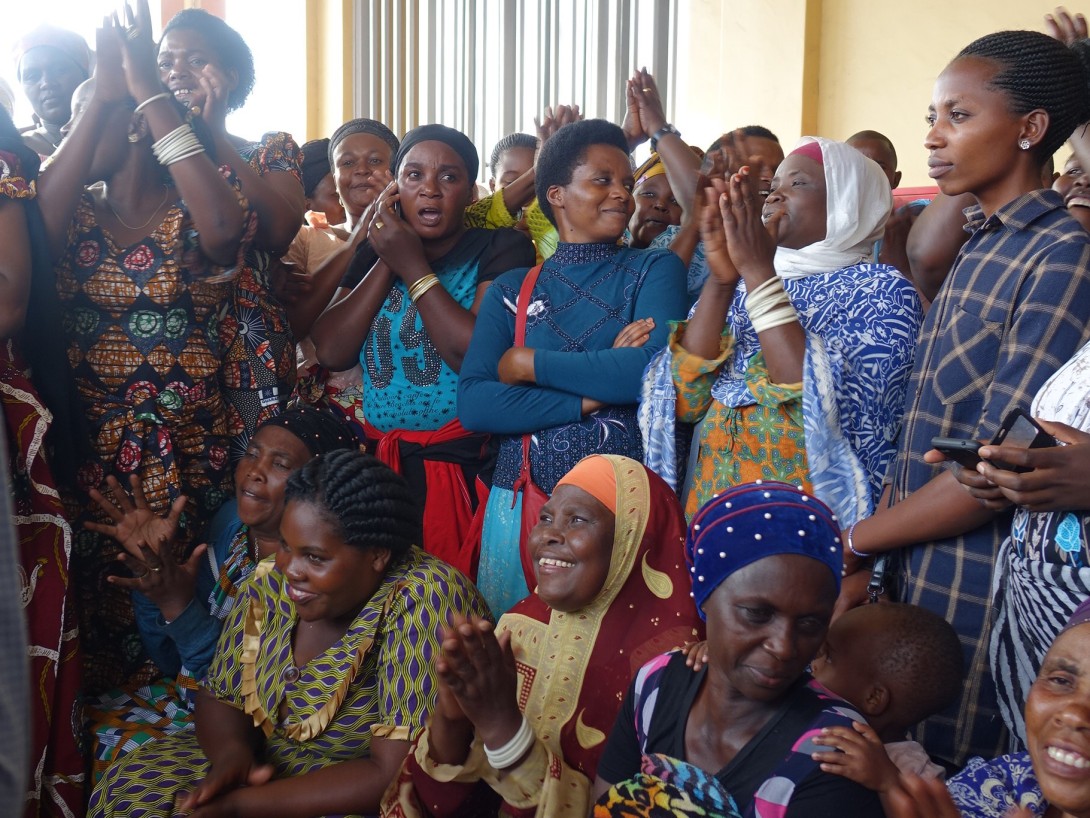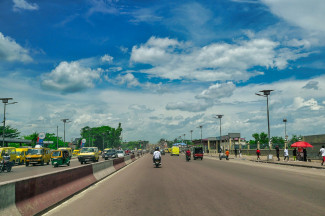Businesswomen creating a united front in Rwanda and the DRC
It’s 9:00 am on a Monday and the Democratic Republic of the Congo (DRC) market town of Goma is bustling with activity. Simire Cibolonza greets a group of women traders who have travelled from the bordering Rwandan town of Gisenyi to provide her with the cabbages she will be selling that week. Theirs is a relationship built on trust; Cibolonza doesn’t have the money to pay them for the cabbages up front so they have arranged for her to pay after she makes sales.
“We are very united,” Cibolonza said.
But it hasn’t always been this way. Despite Goma and Gisenyi being less than ten kilometers apart, decades of conflict had meant relationships between Rwandan and Congolese people have been more often characterized by mistrust, suspicion and outright hostility. Women, who make up 70% of cross border traders, are often the ones impacted most significantly by such tensions.
“Before, we suffered from harassment while crossing to Goma,” said one of the Rwandese women traders.
“And we [the Rwandan and DRC traders] could not help each other because we did not even know each other.”
“This is particularly important when you consider that 64% of women small-scale cross border traders surveyed at border crossing points reported that they rely on cross border trade as their primary means of subsistence,” said International Alert Rwanda Country Manager Betty Mutesi, who has been working alongside the Enhanced Integrated Framework (EIF), the World Bank and TradeMark East Africa to implement a cross border trade agreement that provides a safe environment for small-scale cross-border traders between Rwanda and the DRC.
To ensure their safety, the women traders from Rwanda organized themselves into a cooperative. This, plus investments in safer market infrastructure and trader training on customs procedures has helped Rwandese traders to establish and strengthen relationships with DRC traders such as Cibolonza.
"When people have trade relationships and trust each other, they are more able to navigate challenges together without resorting to violence. Countries that trade are at minimum risk of war."
Betty Mutesi, International Alert Rwanda Country Manager
“We invite each other to family celebrations, we visit each other in hospital when we are sick…. we are no longer afraid of each other,” Cibolonza said.
Mutesi sees these everyday trade relationships as key to what she calls ‘sustainable peace’.
“First and foremost, it creates economic inter-dependencies between communities and, as more people are involved in this trade, increases the cost of conflict. Secondly, when people have trade relationships and trust each other, they are more able to navigate challenges together without resorting to violence. Countries that trade are at minimum risk of war,” she said.
Rwanda and the DRC are not the only countries to be affected by conflict – of the 178 countries analysed in the 2018 Fragile States Index, 32 are considered to be on ‘alert’ or ‘high alert’. Of these, 63% are also classified as Least Developed Countries (LDCs).
Many LDCs depend on primary commodities such as mineral extraction and basic food production. This makes them particularly vulnerable to global market shocks, such as volatile prices or exports drying up.
According to Luisa Bernal, Policy Specialist with the United Nations Development Programme (UNDP), all countries are exposed to multidimensional risks, but some are less able to manage certain risks and less prepared to respond to shocks, making them fragile.
“Many countries facing fragility are highly dependent on trade, so any shock in trade flows can have a devastating effect,” she said.
“South Sudan, for example, is highly dependent on oil, which represents more than 50% of GDP and almost all exports. Oil price fluctuations interact with other vulnerabilities such as high levels of poverty and inequality and low capacity of state institutions, increasing fragility,” Bernal said.
#Trade4Peace, was a topic recently examined by the World Trade Organization (WTO) and EIF at a panel discussion during Geneva Peace Week.
“Peaceful societies are inclusive societies. Promoting equal access to political, economic and social resources – particularly for those most marginalized from governance and decision making like women and young people – through cross border trade will also strengthen the resilience of the border communities to manage conflicts in their communities more widely."
Luisa Bernal, Policy Specialist with the United Nations Development Programme (UNDP)
Panellists discussed how trade creates employment that can alleviate social tensions and unrest, and how efforts to diversify a country’s economy can have a peace-building effect.
“Empowering youth and women to access economic opportunities is particularly important in peace building,” Bernal said.
With its focus on empowering women and young people, Rwanda’s approach to developing an inclusive cross trade border strategy through engaging with all sectors of society to both understand the strategy and give input during the development process, has been key to ongoing peace in Rwanda.

“Peaceful societies are inclusive societies. Promoting equal access to political, economic and social resources – particularly for those most marginalized from governance and decision making like women and young people – through cross border trade will also strengthen the resilience of the border communities to manage conflicts in their communities more widely,” she said.
Since the introduction of the strategy, the volume of trade has also tripled, according to Mutesi.
“The livelihoods of the poorest people have improved as a direct result of this strategy,” she said.
“Traders have been able to pay the school fees for their children, family medical insurance and build their house. There was also a reduction in gender-based violence in the family household,” she said.
Countries in fragile situations are often less likely to attract investment because of complex bureaucratic operating environments and a lack of governing capacity.
Efforts towards economic diversification help address economic vulnerability, Bernal said.
“Support by the international community in improving the business environment, infrastructure and the productive and trade capacity help lay the economic foundation for countries to find a path out of fragility… they represent investments in prevention,” she said.
Development partners need to combine humanitarian response efforts with investments in longer-term development, to protect livelihoods and facilitate economic recovery, Bernal said.
“When national institutions are supported and there are inclusive and participatory spaces for dialogue between private sector, government and civil society, this builds the economic foundations for peace,” she said.
If you would like to reuse any material published here, please let us know by sending an email to EIF Communications: eifcommunications@wto.org.


